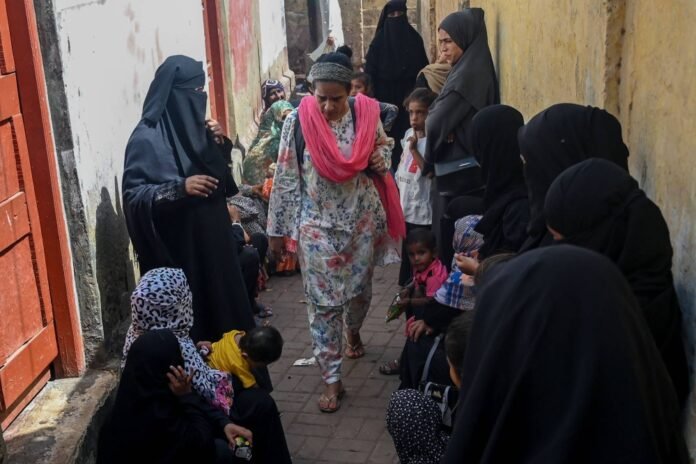On a densely populated island off the coast of the Pakistani city of Karachi, a group of pregnant women wait for the arrival of the only midwife on the mainland during a grueling heat wave.
Every week, Neha Mankani travels by boat ambulance to Baba, an old fishing settlement and reportedly one of the most populated islands in the world, with about 6,500 people living on 0.15 square kilometers.
Climate change is swelling the surrounding seas and baking the land with rising temperatures. Until Mankani’s ambulance was launched last year, expectant mothers were left at the mercy of the elements.
Waiting at the gate of her clinic on the island is 26-year-old Zainab Bibi, pregnant again after a second-trimester miscarriage last summer.
“It was a very hot day, I didn’t feel well,” she recalls. It took her husband hours of negotiating with boat owners before an agreement was reached to take them to the mainland — but it was too late.
“When I gave birth to my baby in the hospital, she was already dead,” she said.
Summer heat affects pregnancies
Heat waves are becoming warmer, longer and more frequent in Pakistan. Pakistan is one of the countries most vulnerable to extreme weather events due to climate change.
In May and June there were several heat waves with temperatures rising above 52 degrees Celsius for days on end.
“Climate change does not affect everyone the same,” Mankani, 38, told reporters during the 20-minute boat ride.
“Pregnant women, newborns and women who have just given birth are definitely more affected,” she said.
“During the summer months we see a clear increase in the number of children with low birth weight, premature births and miscarriages.”
Women are at greater risk of stillbirth when exposed to temperatures above 90% of normal for their location, experts writing in the British Journal of Obstetrics and Gynaecology last year said.
“Before, we didn’t have the evidence, a lot of it was anecdotal,” Mankani said. “But we’ve been seeing the impact of climate change for a while.”

Neha Mankani sits on the shore of Baba Island, along the Karachi Harbor, in Karachi, Pakistan, on June 11. | AFP-JIJI
In Pakistan, 154 women die per 100,000 live births. According to the United Nations, this is a high maternal mortality rate that is determined by socio-economic status, barriers to access to health care and limited decision-making power, especially among young women.
Mankani began her 16-year career as a midwife in a hospital in Karachi, where she worked in a high-risk unit, often treating women from the five islands off the coast.
She founded the Mama Baby Fund in 2015 and set up the islands’ first clinics for expectant and new mothers. “Everyone opened their homes to us,” she said.
Last year, the free 24/7 boat ambulance followed, which is well equipped to navigate the rough seas in a region increasingly prone to flooding.
Sabira Rashid, 26, gave birth to a baby girl she named Eesha two months ago after a stillbirth and a miscarriage at seven months. She blames her painful loss on not getting to the hospital in time.
“At the dock they make us wait because they don’t want to transport just two or three people. They told us to wait for more passengers, regardless of the emergency,” she said.
Rising, dirty water
Girls on the impoverished islands are often married off as young as 16. Marriage is seen as a source of safety for women in an area where polluted waters are destroying fishing.
“Most of these girls don’t know how to take care of themselves. They get serious infections because of the dirty water they are constantly exposed to,” says Shahida Sumaar, an assistant at the clinic, wiping sweat from her face.

A woman shakes a cradle with her granddaughter at their home on Baba Island, in Karachi Harbour, in Karachi, Pakistan, on June 6. | AFP-JIJI
The 45-year-old says new mothers are given basic advice during heatwaves, such as using dry, clean towels to wrap their newborns, washing breasts before feeding and ensuring they stay hydrated.
But with no running water and little electricity, avoiding heat stress is a challenge for all islanders.
Women are particularly at risk, often cooking over open fires in small spaces without fans or proper ventilation.
Ayesha Mansoor, 30, has four children and lives on the outskirts of Baba, with only four to five hours of electricity a day.
The path to her house is covered in a carpet of discarded plastic bags that disappear under water at high tide.
“Only those who have solar energy can cope better with the heat. We can’t afford it,” she said, brushing away flies that had landed on her baby.
Mariam Abubakr, an 18-year-old clinic assistant who grew up on the island, hopes to become the first full-time midwife.
“I always wondered why we women didn’t have facilities here, a clinic specifically for us,” she said.
“When Neha opened her clinic, I saw a way I could help the women in my community.”



